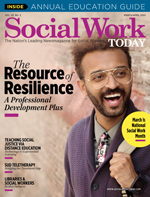|
Resilience has been the subject of social work and behavioral health research for decades. As social work and mental health, behavioral, and social work practitioners transitioned from a pathology focus to a strengths-based perspective, it became generally understood that resilience is a characteristic that can be grown and developed. According to a 2015 working paper from the Center on the Developing Child at Harvard University, “… [the] combination of supportive relationships, adaptive skill-building, and positive experiences constitute the foundations of what is commonly called resilience.” We know that there is a connection between adverse childhood experiences and a wide range of issues such as mental health conditions, substance use disorders, lower educational achievement, chronic disease, and many more. However, not all individuals exposed to adversity experience these challenges. Why do some people develop adaptive capabilities and others do not? This question will continue to be the topic of research, but the good news is that resilience building is available to many individuals, groups, and communities with the resources and energies to apply them. One such community is the topic of this issue’s cover story. Florida State University’s Resilience Project is a web-based, research-informed toolkit developed to encourage students’ wellness. It aims to prepare them for the obstacles and challenges that they will inevitably encounter throughout their professional and personal lives. Individuals may arrive on campus having experienced trauma in their personal and family lives, they may experience it while attending the university, or they may never have experienced trauma. One thing is certain, though—when they start their careers as social workers and move through that journey, they will inevitably be affected by the experiences they have with their clients, seeing and hearing about the challenges in their clients’ lives, and the potential moral distress they may experience when colleagues and employers fail to fulfill the mission and values of social work’s Code of Ethics. According to Mark Horwitz, PhD, MSW, JD, an associate professor at Westfield State University interviewed for this cover story, “These are completely overwhelming jobs. They’re complicated almost beyond comprehension. Our assumptions get shattered. Things that happen to us shatter our understanding of safety and meaning, and we shut down a little bit until we rebuild our beliefs about this world.” A necessary tool in every social worker’s professional development toolbox is resilience and social work educational institutions are recognizing their responsibility in fostering its growth. Wishing all social workers a happy, meaningful, and resilient Social Work Month! |

 Editor’s Note: Recognizing Resilience
Editor’s Note: Recognizing Resilience 